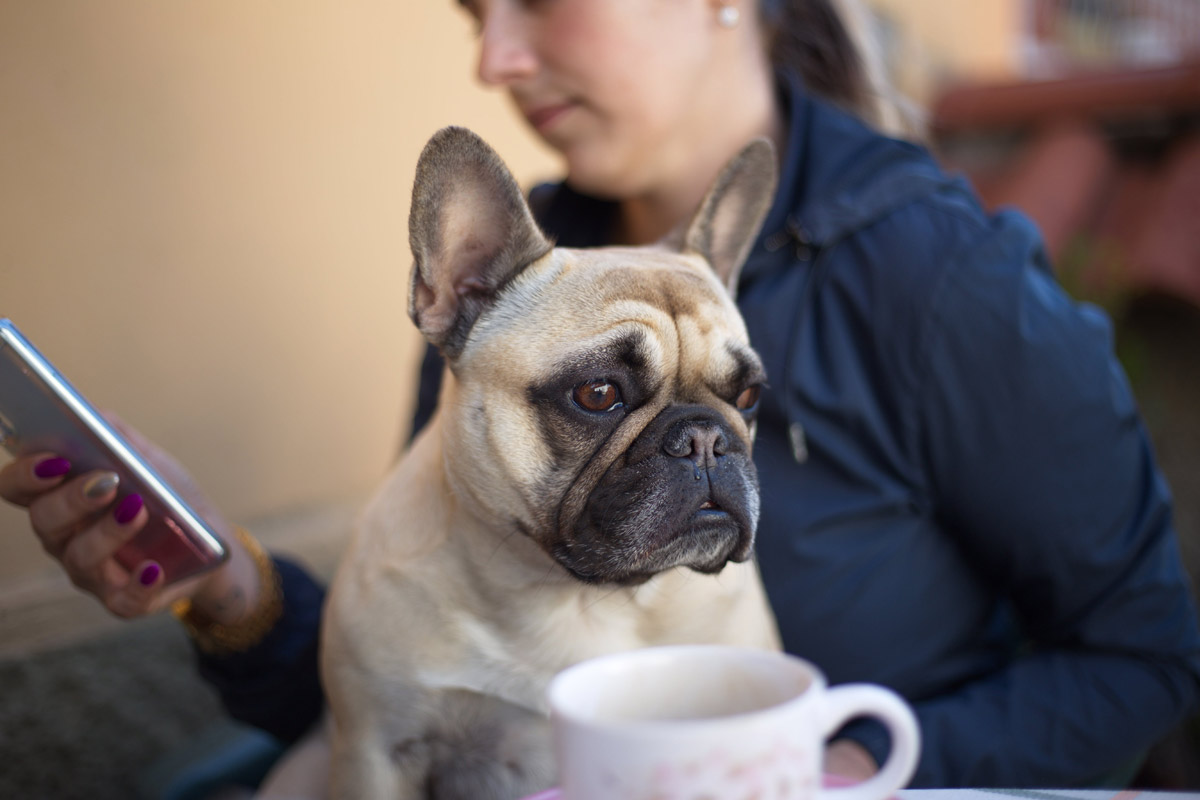
My Girl and I had an unexpected trip to the vet this weekend. She’s ok! Turns out the snazzy new harness I bought her was irritating a skin tag on her elbow. She seemed unperturbed, it wasn’t until I saw she was licking blood away that I realized something was amiss. Needless to say the harness has been thrown out, the vet gave us a cleaning solution and special ointment to treat the area, and I’ve been apologizing profusely ever since. While we were sitting in the vet’s waiting area, an adorable French bulldog came in with her papas. She was a sweet thing, but my goodness did the sound of her breathing permeate the room. The poor baby! And I thought back to French bulldogs being named America’s new favorite breed, and all the comments about the health woes of brachycephalic breeds. Well, the results of a new study make it official, as they found that small, long-nosed dogs live longer:
By a nose: Once size, face shape and sex were taken into account researchers found that overall small, long-nosed female dogs tended to have the longest lifespans among pure breeds, notching up a median of 13.3 years. However, breeds with flat-faces — a trait that has become fashionable in recent years — had a median lifespan of 11.2 years, and a 40% increased risk of shorter lives than dogs with medium-length snouts, such as spaniels.
The interaction of the key features: “Whilst previous research had identified sex, face shape and body size as contributing factors in canine longevity, no one had investigated the interaction between the three or explored the potential link between evolutionary history and lifespan,” said Dr Kirsten McMillan, the first author of the research from the charity Dogs Trust. Writing in the journal Scientific Reports, McMillan and colleagues report how they analysed data from 584,734 pure and crossbred dogs — 284,734 of which had died — gathered from 18 organisations, including rehoming and welfare organisations, breed registries and pet insurance companies.
The results: Taking into account all breeds and crossbreeds, the team found the median canine lifespan was 12.5 years, with female dogs living slightly longer than males. To delve deeper, the team looked at dogs from 155 pure breeds, finding larger dogs tended to have shorter lives than smaller dogs, while the length of a breed’s nose also mattered. Indeed, while miniature dachshunds had a median lifespan of 14 years, the figure was 9.8 years for French bulldogs. Experts have long said that brachycephalic breeds are prone to a plethora of health problems, including breathing difficulties and skin problems.
This was surprising: The team also found the median lifespan for pure breeds was longer than for crossbreeds, at 12.7 years and 12 years respectively, a result that is at odds with the idea that crossbreeds might be healthier because they have greater genetic diversity. However, they were unable to consider different types of crossbreeds, meaning data for dogs of unknown parentage was combined with data from “designer” mixes such as the labradoodle that may have far more inbreeding, potentially muddying the waters.
More data to gather: While the team did not have data on how the dogs died, they hope the study will spur others to unpick the risk factors behind the variations in lifespan. McMillan noted the differences were probably down to a complex mix of biological factors, such as body shape and genetics, as well as environmental factors including diet, exercise and training.
How to use these results: “In general, these results help potential owners, breeders, policymakers, funding bodies, and welfare organisations make informed decisions to improve the welfare of companion dogs,” she said. “But more specifically, I think this provides an opportunity for us to improve the lives of our canine companions. We are identifying groups that desperately need attention, so we can zone in on these populations and work out what the problem is.”
Obviously there are a lot of mitigating factors that play into a dog’s life and health. So while My Girl lucks out with the key factors this study points to (being a girl, small, and bearing the nose of a dachshund), her weight is over what it should be. To the point where if one more person stops to ask if she’s expecting I’m gonna snap, “We’re not pregnant, we’re FAT!!” The kid loves food. She treats our walks like scavenger hunts — a remnant, I think, from the first 1.5 years of her life when she had to fend for herself — and inhales her food bowl when I put it down. And her figure isn’t all bad! She’s very shapely, she’s even been called sexy by our neighbors! It’s just that she could do with a canine tummy tuck. But at this point, she’s about to turn 12. So when the vet tells me to cut back her food portions (which aren’t that large to begin with) my impulse is that I don’t want to make her deprived and miserable, all in the name of extending her life. Quality of life matters for our pups, too, a point I thought the researcher deftly made in her last quote. She didn’t outright say “we need to stop breeding flat-faced dogs,” but she hinted at it in palatable words.
Photos credit: Nataliya Vaitkevich, Damir Mijailovic, WKN, Dominika Roseclay, Zuriel Trej and Sarah Chai on Pexels




















I know humans see animals as there to be used as we wish (which I don’t like but accept as reality) but the way we have bred dogs to the point where we’re damaging them really hurts me.
I’m currently having the opposite weight issue with the cat, after a lifetime of having his food weighed to stop him over-eating, old age (15 1/2) and kidney disease are doing a number on him and he’s so skinny. He will still eat chicken with enthusiasm so I’m currently breaking the bank buying him chicken (he doesn’t care if it’s free range ad organic but for the sake of the poor birds I do) to try and get a bit of weight back on him.
The things we do for our pets!
Aw, I love this so much!! My dachshund mix is turning FOURTEEN in April, and is doing really amazing, in spite of her age (although she too has a slight weight problem due to treat addiction). I adopted her back when I was an undergrad and she was just 8 weeks old… She’s been my ride or die for so long, I wish she could live forever. This article just made my whole morning.
Funny side note: When I adopted her, the mama was still at the shelter and able to nurse the puppies, so I know the mom’s breed (a Cavalier King Charles spaniel), but the puppies all looked like dachshunds. A few years ago, I did one of those dog DNA tests to see if she had, like, any chihuahua in her, or maybe corgi (just out of curiosity)…. There must have been a mixup at the lab — results came back saying she was a German Shepherd/Poodle mix with zero percent spaniel or dachshund detected. LOL. Idk if others have had any luck with those tests, but based on my experience I wouldn’t recommend!
My dog just turned 14! She’s a great old gal – Irish terrier.
Re the DNA tests – I think it was CBC Marketplace that did a show on those, and they sent in human DNA for one of the tests, and it came back with a dog breed. So yeah. Probably not the most reliable.
Our beagle was with us for 17 years
My two loves, a rescue one-year old Boxer I adored for ten years and a rescue 10-week old Terrier/Border Collie I adored for 17 years both loved me unconditionally as I did them. There are two dog-shaped holes in my heart that have never healed. 💔💔
My female dachshund passed away last March at 15. She was going strong until the very end (well, except for the slight weight thingy – yep, her treats were my command). Side note: we lived overseas, and most international carriers I used only let long-nosed pups fly.
My male dachshund passed away in late October of last year and was 16 1/2. It is hard being without my little one.
I am so sorry! Yes…I am still devastated and telling myself we had the best 15 years isn’t quite cutting it, but we did have a great run. How they so profoundly worm their way into your heart…best to you.
This is the great news….our little Italian Greyhound grand dog is the best little guy, we babysit him several days a week while our daughter is working. And our little dachshund lived a very long happy fairly healthy life at 17 1/2 years. Good thing for long snouts 🙂
I just looked those up, adorable! I still miss the best little dog ever, our dachshund-poodle Tippy. Who also had a wee bit of a weight problem toward the end, but don’t we all?
My dachshund Kirby passed away in late October at 16 1/2. I miss him still because I had him since he was 10 weeks old.
We’ve always had mixes from shelters, and were lucky to have very cuddly, sweet-natured dogs that were easy to train, usually medium-sized.
The oldest and biggest was a, presumably, retriever-setter mix who loved playing piano – we always had to make sure to close the lid – and driving cars, meaning he somehow managed to jump to the front and “grab” the wheel before we could secure him in the back, and always had to push him off the driver’s seat, or bribe him with a treat if we didn’t have much time for his silly antics.
🐕
I am interpreting this to mean that my dog is going to live forever and that is the only acceptable outcome of this research.
🥹😍
Funny, I came to the conclusion.
My sweet little three-legger, Archie, is a Boston terrier, Chinese crested, poodle (and I swear to God also some whippet) mix and fortunately inherited a longer nose than his Boston Terrier mother.
Last summer at the vet’s office, our favorite tech referred to him as a geriatric terrier and I was so offended! She reminded me he was 9 and definitely in his elder years. I told her that Archie and I have a deal that he’s going to live to be at least 20 so he’s barely middle-aged.
Humans have absolutely tortured dogs with some of the issues we’ve bred into them, like brachy dogs not being able to breathe! Legislators are in New Hampshire are actually trying to pass on a ban on breeding/selling these dogs (don’t worry, you’ll still be able to adopt existing pups, but it’s a way to stop breeding this impairment that causes a lot of dogs to suffer and have shortened life spans).
Our yorkie lived to be 18!!!!!!!!!!
My dachshund Rafa is about to turn 2 in the spring so all of these long-lives weiners make me happy! Even if the little bugger stole my breakfast off my plate this morning…
The senior dog (almost 15) I caretake part-time is still going strong after liver surgery and a broken foot last year. We joke that he only keeps going for the possibility that one of us might, at some point, drop a cheeseburger on the floor.
Frenchie are a walking health problem, I foster special needs frenchies and bulldogs. That said I’ve had 4 Bostons and my girl passed away last year at over 16, none of mine have had any breathing problems or really health problems in general until age caught up with them. My girl passed of kidney disease but we kept her in stage 1&2 for 2.5 years, the vets were amazed at how long she lived for. My boy had a brain tumor and passed at 14.5.